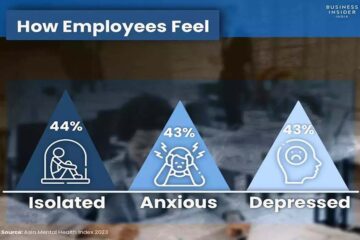The Managerial Impact on Mental Health: Insights from UKG Report

Unveiling Managerial Influence on Mental Health
A report by Ultimate Kronos Group (UKG) sheds light on a significant revelation: managers wield as much influence on employees’ mental well-being as their partners do, if not more. This finding underscores the pivotal role of managerial support in fostering mental health in the workplace, surpassing even the impact of healthcare professionals.
Identifying Challenges in Mental Health Support
The report, titled Mental Health at Work: Managers and Money, identifies various factors contributing to mental health challenges at work. These include divergent perspectives on mental health support, inadequate communication channels, and the burdensome responsibility of leadership. Furthermore, ongoing global crises have exacerbated mental health concerns among employees.
Insights from the Survey
Conducted by The Workforce Institute at UKG, the survey encompassed 3,400 respondents across 10 countries, aiming to highlight the indispensable role of jobs, leadership, and managerial practices in nurturing mental health both within and beyond the workplace.
Balancing Job Demands and Mental Well-being
While one in five employees worldwide acknowledges their job’s adverse impact on their mental health, women appear to bear a disproportionate burden, with 23% reporting negative mental health effects compared to 16% of men. Middle managers, tasked with employee management and performance objectives, face particularly daunting challenges, earning them the title of having the “hardest job.”
The High Price of Stress
The survey reveals concerning trends regarding job-related stress and its consequences. Nearly half of managers and 40% of C-suite executives express intentions to quit within the next year due to work-related stress. Interestingly, self-imposed pressure constitutes a significant stressor for C-level leaders, with 42% attributing their stress to internal expectations.
Prioritizing Mental Health over Monetary Gain
Despite financial incentives, a staggering 81% of employees prioritize good mental health over lucrative job prospects. Moreover, 64% express willingness to accept a pay cut in exchange for a job that better supports their mental well-being. Notably, Generation Z exhibits the highest inclination (70%) to prioritize mental health, while boomers display the lowest propensity (46%).
Addressing the Silence
A glaring disparity emerges regarding perceptions of mental health support between employees and organizational leadership. While 91% of C-level executives perceive the human resources department as a reliable mental health resource, only 64% of workers share this sentiment. Moreover, communication barriers hinder employees from seeking support, with 38% citing infrequent discussions with managers about workload concerns.
Cultivating Emotional Intelligence in Leadership
The report emphasizes the need for cultivating emotional intelligence among leaders across all organizational tiers. Skills such as stress management, impulse control, and empathy are deemed essential for effective leadership, transcending technical competencies. By nurturing these qualities, managers can better support their teams and foster a culture of psychological well-being.
Advocating for Open Dialogue
Ultimately, the report underscores the prevalence of silent suffering among employees and the imperative for leaders to initiate conversations about mental health. By normalizing discussions around day-to-day stressors and personal struggles, leaders can cultivate an environment of empathy, solidarity, and support within their teams.
Conclusion: Paving the Path to Mental Wellness
In conclusion, the UKG report underscores the indispensable role of managerial support in promoting mental health resilience in the workplace. By prioritizing open communication, fostering emotional intelligence, and advocating for holistic well-being, organizations can cultivate a culture that prioritizes mental wellness, fostering productivity, engagement, and employee satisfaction.















